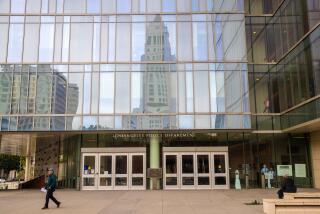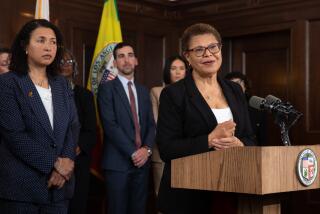Editorial: Los Angeles 2020 Commission delivers a modest plan for major problems
Three months ago, the Los Angeles 2020 Commission issued a bleak assessment of the city’s problems and an indictment of its political leadership for allowing L.A. to become, as the report said, “a city in decline.” On Wednesday, the panel of prominent business, labor and civic leaders offered its plan for restoring Los Angeles’ luster.
The “Time for Action” report includes 13 recommendations, ranging from the innovative to the common-sense to the misguided. Some merit fast action, such as a “truth in budgeting” ordinance that would require city leaders to budget for three years instead of one, in order to take into account the longer-term consequences of today’s decisions. Several others have potential and deserve additional study, such as the proposal to merge the independently operated ports of Los Angeles and Long Beach to make them more globally competitive.
Taken in totality, however, the report is disappointing in that its modest recommendations do not offer city leaders a persuasive plan to reverse the city’s “decline.”
RELATED: The Los Angeles 2020 Commission report
When City Council President Herb Wesson tapped former U.S. Secretary of Commerce Mickey Kantor to put together the commission, the city was at a low point. Voters had just rejected a proposed half-cent sales tax measure to balance the budget. There was a sense that Los Angeles was economically and politically stuck in neutral. The hope was that a panel of labor, business and political leaders, through research and discussion, would be able to bridge their ideological differences and offer bold new ideas to address the city’s most challenging problems: the chronic budget deficits and the growing pension obligations that take money away from public services, the inability to attract and retain companies that create middle-class jobs, and the failure to consistently invest in infrastructure or to develop long-term plans to make the region more competitive.
Instead, the commission’s recommendations are insufficient to address the enormous problems laid out in the preliminary report. It turns out that it’s a lot easier to declare “a crisis in leadership” than to build the consensus needed to recommend major, comprehensive reforms that will, by necessity, alienate one constituency or another. The commission, for example, doesn’t offer suggestions on how to deal with the city’s unfunded pension and retiree healthcare liabilities, calling instead for another commission to make specific recommendations. There are few specific ideas on how to reduce the hurdles that discourage new businesses from opening or expanding, or how to fix the regulatory burdens that have made L.A. “the least business-friendly city” in the region, as the commission’s first report noted. The proposed new Office of Transparency and Accountability sounds like it would duplicate a good portion of what City Administrative Officer Miguel Santana’s office already does.
Still, Mayor Eric Garcetti and the City Council should look carefully at each recommendation, as well as the informal call for a higher countywide minimum wage, as they search for policies to revitalize the city.
More to Read
A cure for the common opinion
Get thought-provoking perspectives with our weekly newsletter.
You may occasionally receive promotional content from the Los Angeles Times.






